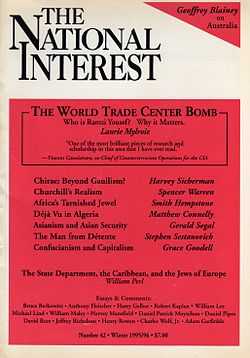- The National Interest
-
The National Interest 
Winter 1995/96 coverEditor Robert W. Merry (since September 2011) Categories International affairs Frequency Bi-monthly Founder Irving Kristol First issue 1985 Company National Affairs, Inc. (1985–2001)
The Nixon Center (2001–present)Country  United States
United StatesWebsite nationalinterest.org ISSN 0884-9382 The National Interest (NI) is a prominent conservative American bi-monthly international affairs magazine published by the Center for the National Interest. It was founded in 1985 by Irving Kristol and until 2001 was edited by Anglo-Australian Owen Harries. The National Interest is not restricted in content to “foreign policy” in the narrow, technical sense but attempts to pay attention to broad ideas and the way in which cultural and social differences, technological innovations, history, and religion impact the behavior of states.
Contents
Positions
In 1989, NI published Francis Fukuyama's controversial article, "The End of History?." In covering the fall of the Soviet Union, The National Interest's featured contributors included not only specialists like Richard Pipes and Robert Conquest but also Nobel Prize-winning novelist Saul Bellow. The magazine was one of the first to devote attention to questions such as geoeconomics and has explored concepts such as "superpower fatigue" and "developmental realism."[citation needed]
In 2005, 10 of the 14 members of NI's editorial board, led by Fukuyama and upset by the Nixon Center's changes to editorial policy, decided to leave the journal and create a rival publication, The American Interest. This split was seen as representative of a larger schism among Republicans and the end of an uneasy alliance between neoconservatives and realists that had characterized the Reagan years. In recent issues articles broadly critical of the direction of foreign policy under the George W. Bush administration have been published by senior members of the old Republican party establishment, most recently Brent Scowcroft and James Baker.
While The National Interest still has contributions from neoconservative and liberal authors, it articulated growing opposition to a number of Bush Administration policies, including skepticism about democracy promotion and the feasibility of taking military action against Iran; in recent years, NI has even published some right-wing libertarian views regarding freedom, the role of the executive, and foreign intervention.
The magazine tends to support continued engagement with China and Russia despite non-democratic practices at home and challenges to U.S. policies abroad.[citation needed] Articles by a number of long-time conservative thinkers—Robert Tucker and Graham Fuller among them—have questioned the conservative credentials of the administration, and the magazine has tended to gravitate toward positions taken by Senator Chuck Hagel, to a lesser extent Richard Lugar (with the exception of his stance on policy toward Russia) and John Warner.
Readership and design
NI has an international readership, and excerpts from its articles have been published in the New York Times, Financial Times, The Australian, International Herald Tribune, Shin Dong-A, The Spectator, and Austria's Europäische Rundschau, as well as on online sites such as the Russian Inosmi.ru.
In 2006, the magazine adopted a new, glossier cover format, based around a central image and tagline, making it look more like the Georgetown Journal of International Affairs or Foreign Policy than Foreign Affairs or Commentary, which have only text on their covers. The magazine also added daily online content to its website.
Editors
Since September 2011, the magazine's editor is Robert W. Merry.[1] The Advisory Council is chaired by James Schlesinger. The magazine's honorary chairman is Henry Kissinger. Dimitri K. Simes is the Publisher, while Paul J. Saunders is the Associate Publisher.
Among the members of the magazine's advisory council are Morton Abramowitz, Graham Allison, John Mearsheimer, Daniel Pipes, and Dov Zakheim. The contributing editors are Andrew J. Bacevich, Ian Bremmer, Ted Galen Carpenter, Bruce Hoffman, John Hulsman, Andrew Kohut, and Ray Takeyh. Anatol Lieven, Daniel Drezner, former editor Nikolas Gvosdev, Jacob Heilbrunn, and Ximena Ortiz serve as senior editors.[2]
Alexis Debat resigned as a contributing editor in September 2007 after revelations appeared in the French and American press that he had fabricated interviews with leading U.S. political figures for the French magazine Politique Internationale.[citation needed]
See also
- The American Interest, founded in 2005 by former members of the NI editorial board
- National Affairs
References
- ^ Robert W. Merry Named Editor of The National Interest, a September 19, 2011 announcement from the journal's website
- ^ Masthead nationalinterest.org
External links
Categories:- Publications established in 1985
- Conservative American magazines
Wikimedia Foundation. 2010.
